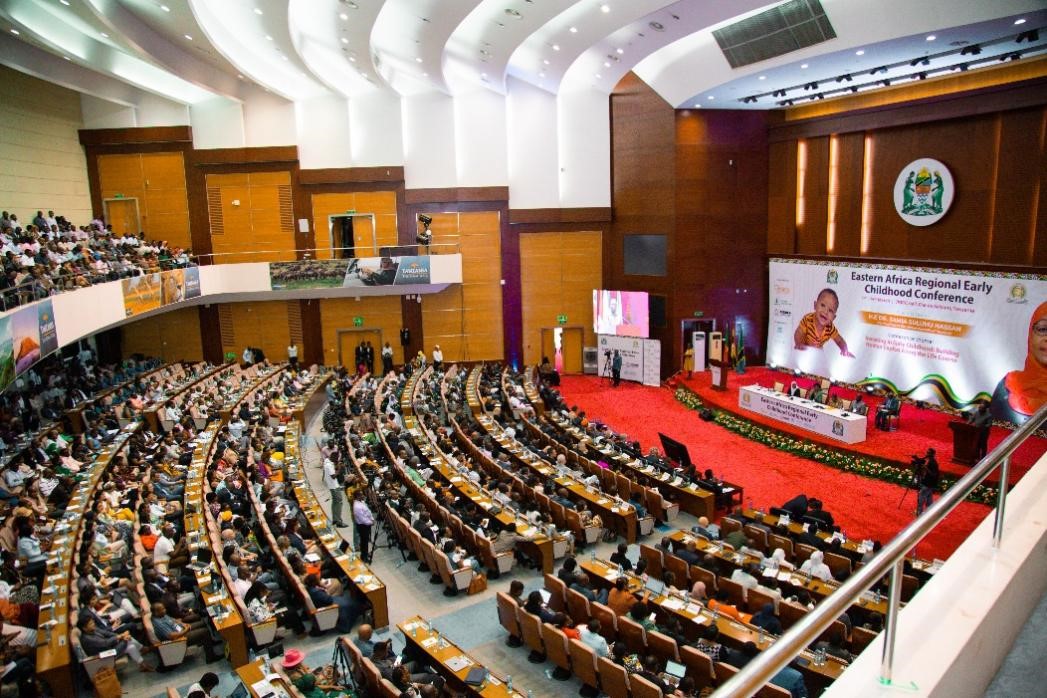The Eastern Africa Regional Conference on Early Childhood Development took place in Dar-es-Salaam, Tanzania, from March 11th to 14th, 2024, under the theme: Investing in Early Childhood: Building Human Capital Along the Life Course. This significant event drew 1,000 delegates from across Eastern Africa and beyond, including policymakers, program implementers, field practitioners, researchers, development partners, and NGOs. The conference served as a dynamic platform for sharing research findings and showcasing innovative practices, allowing participants to learn from each other and explore opportunities for replicating and scaling up effective interventions.
Focus on workforce development: Building a Resilient ECD Workforce
One of the critical themes addressed during the conference was workforce development, which featured prominently in both parallel and plenary sessions. The parallel session on Building a Resilient ECD Workforce included three key presentations. One highlighted the REPSSI program, which focuses on enhancing the capacity of Early Childhood Development (ECD) workers to provide mental health and psychosocial support to adolescent and young mothers. This intervention demonstrated that strengthening the capacity of ECD workers significantly improved the mental and psychosocial well-being of young mothers and fostered better caregiver-child interactions.
Other notable presentations in this session included Professionalizing ECCE in South Africa: Determining Skills Gaps and Implications for Future Sector Development by Northwest University and Lessons Learned from Implementing a Gender-Responsive Play-Based Teacher Training in Early Childhood Education in Rwanda and Mozambique by Three Stones International.
Insights and Future Directions for ECD Workforce Development
The main session on workforce development featured a keynote address and a panel of experts who provided diverse perspectives on workforce development across health and education sectors. The panel underscored the importance of domestic workers as a crucial part of the ECD workforce and called for better consideration of their working conditions. Amina Mwitu from the Aga Khan Foundation shared insights on how their partnership with the Madrasa Early Childhood Programme in East Africa has supported the professional growth of over 10,000 frontline workers in education and health. The Foundation also introduced a competency-based framework for training health volunteers, further enhancing the capacity of the ECD workforce.
Given Daka from the Africa Early Childhood Network (AfECN) presented a snapshot of the ECD workforce's current status, drawing from a Landscape Analysis conducted under the Early Childhood Workforce Initiative. The analysis revealed that Africa’s early learning workforce is predominantly female and faces significant gender inequalities. The region also struggles with a severe shortage of early learning teachers, with countries like the Democratic Republic of Congo needing 536,000 new teachers and Ethiopia requiring 473,000.
The ECD workforce faces numerous challenges, including fragmented early learning systems, low compensation, unstable work conditions, and inadequate development opportunities. These issues hinder the recruitment, training, and retention of qualified personnel, ultimately impacting the development of a robust early learning workforce. Bob Muchabaiwa, a Social Policy Specialist at UNICEF-Eastern and Southern Africa Regional Office (ESARO), emphasized the need to unlock both private and public financing to realize the full potential of ECD in the region, with a particular focus on investing in the workforce.
In conclusion, the conference underscored the importance of policy reforms in teacher recruitment, development, compensation, and human resource planning. Co-hosted by AfECN, the Tanzania Early Childhood Development Network (TECDEN), and the Government of Tanzania, the event demonstrated the power of collective action in finding innovative solutions to advance sustainable early childhood development across the region. The presence of five Ministers from Eastern Africa further highlighted the event's significance.
Discover early childhood workforce related resources in ECWI’s knowledge hub.

